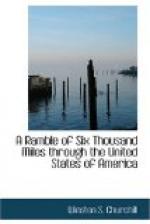Mr. Birkbeck was called “Emperor of the Prairies;” and notwithstanding the hostility of his neighbours, he seems to have been much respected in the other parts of Illinois, as he was chosen secretary of state; and in that character he died, in 1825. He at last devoted himself entirely to gaining political influence, seeing that it was the duty of every man in a free country to be a politician, and that he who “takes no interest in political affairs,” must be a bad man, or must want capacity to act in the common occurrences of life.
From Albion we proceeded towards the Little Wabash; but had not got many miles from that town, when an accident occurred which delayed us some time. We were driving along through a wood of scrub-oak, or barren, when our carriage, coming in contact with a stump that lay concealed beneath high grass, was pitched into a rut—it was upset—and before we could recover ourselves, away went the horse dashing through the wood, leaving the hind wheels and body of the vehicle behind. He took the path we had passed over, and fortunately halted at the next corn-field. We repaired the damage in a temporary manner, and again set forward.
After having crossed the Little Wabash, we had to pass through three miles of swamp frequently above our ancles in the mire, for the horse could scarcely drag the empty waggon. We at length came out on “Hardgrove’s prairie.” The prospect which here presented itself was extremely gratifying to our eyes. Since I had left the little prairie in the Wyandot reserve, I had been buried in eternal forests; and, notwithstanding all the efforts one may make to rally one’s spirits, still the heart of a European sickens at the sameness of the




